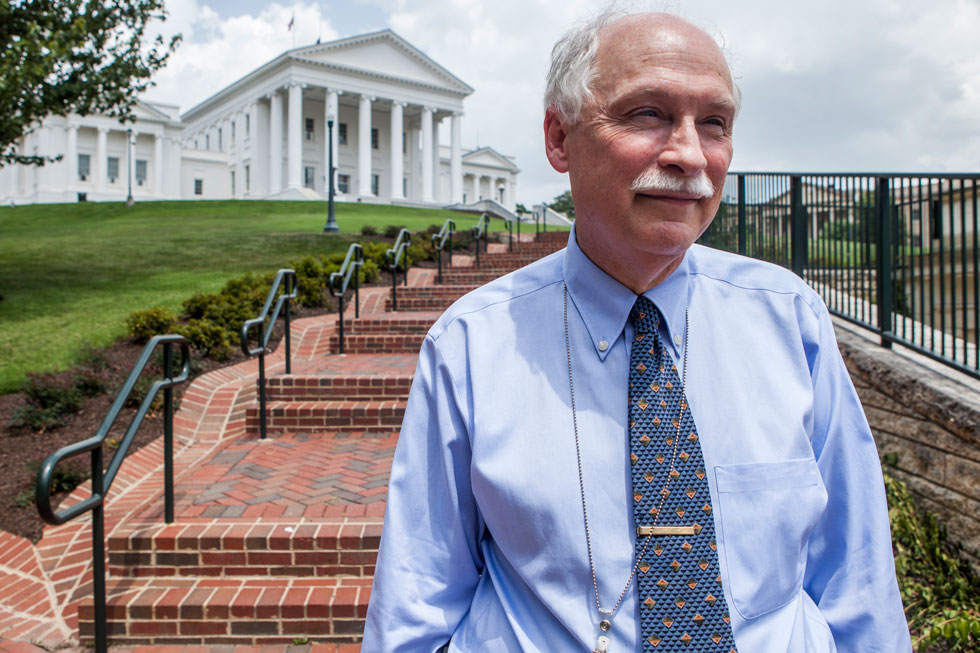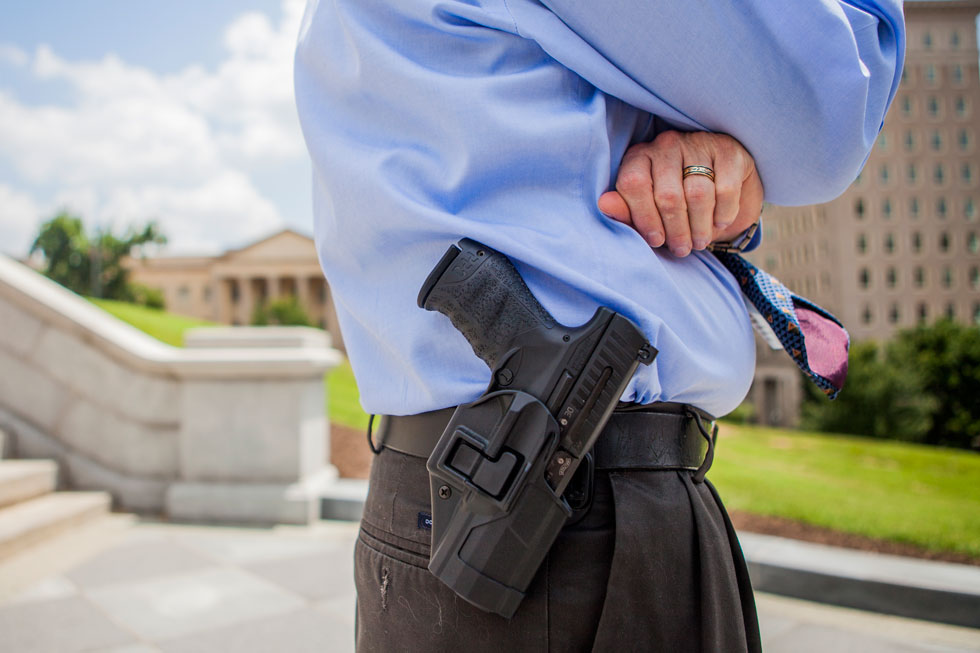Virginia Dems seeking more regulation run into impenetrable committee wall
Just one week into Virginia’s 2014 legislative session, dozens of people swarmed the state Capitol for what would become one of the year’s most important hearings on gun bills.
Inside the packed conference room, lawmakers considered bills on gun show background checks, public library bans and ammunition limits. Listening to the hours long debate, supporters represented their cause by the color of stickers on their chests: the blaze-orange ones read “Guns Save Lives” and the pale yellow ones read “Background Checks Save Lives.”
But before any lawmakers cast their votes, both sides knew their fate. Republican lawmakers dominate the House of Delegates’ Militia, Police and Public Safety Committee, which has guarded the Second Amendment in Virginia for decades. Gun control supporters have another name for it: “The place where gun bills go to die.”
Phil Van Cleave, a pistol-toting man in his early 60s, who sat in his normal seat a few feet from the lawmakers, described the afternoon as “just another committee meeting.” He is used to winning.
For 20 years, Van Cleave has blocked nearly every attempt to tighten the state’s gun laws, with the help of a powerful grassroots lobby called the Virginia Citizens Defense League. As a trusted spokesman for Virginia’s nearly 300,000 concealed-weapon permit holders, members of the House gun committee turn to him for a nod of approval on most bills.
“It’s almost like he’s the Roman Emperor. He’ll give the thumbs up or thumbs down, then the word spreads quickly on the committee,” said Delegate Marcus Simon, a Democratic committee member from the Washington, D.C., suburbs. “It’s hard to deny he gets a vote.”
Van Cleave successfully fought off new gun laws in the wake of the 2007 Virginia Tech shooting, the deadliest in U.S. history. Instead, he and the Virginia Citizens Defense League shaped laws that poured $42 million into mental health support. Virginia’s mental health system was scrutinized after state officials learned that warning signs of Tech shooter Seung-Hui Cho’s violent behavior had been missed.
Gun control advocates had higher expectations in 2014. For the first time in 24 years, Democrats controlled the top statewide offices, as well as the Senate. Gov. Terry McAuliffe — whose campaign was buoyed by $2 million from gun control advocates — proudly touted his “F” rating from the National Rifle Association and boldly called for universal background checks in his stump speeches.
By the end of the session, no gun control bills survived and Virginia’s reputation was affirmed as one of the most gun-friendly legislatures in the country.
Again, Van Cleave was not surprised.
“They know their legislation doesn’t stand a chance,” he said. “They haven’t gotten anything done in a decade.”

Virginia Citizens Defense League lobbyist Philip Van Cleave carries his firearm in the state Capitol in Richmond on July 2, 2014. Photo by Morgan Spiehs/News 21.
‘The killing field’
Within the House of Delegates, most members of the Militia, Police and Public Safety Committee are unbending supporters of Second Amendment rights.
They have fought for the gun rights of individuals convicted of domestic abuse as well as those committed to mental hospitals, said another Democrat on the committee, Alfonso Lopez.
“It’s like talking to a brick wall a lot of the time,” Lopez said. Sometimes, he said, the views of his GOP colleagues are so hard-lined that Democrats do not try to compromise on their bills. It’s simpler to just vote no.
“It’s the killing field. It is the key obstacle,” said Lori Haas, who began working for the Coalition to Stop Gun Violence after her daughter survived the shooting at Virginia Tech, where she was shot twice in the head.
Haas, and gun control proponents nationwide, argue Virginia’s laws are dangerously lax compared to dozens of other states. A 2012 report from the Brady Campaign to Prevent Gun Violence said the state’s weak laws “help feed the illegal gun market, allow the sale of guns without background checks and put children at risk.”
In a state that news outlets have called the East Coast armory of criminals, gun rights advocates have earned a slew of major victories recently. In 2010, Virginia began letting permit holders bring loaded guns into restaurants that serve alcohol. Two years later, the state repealed a 19-year-old ban on purchasing more than one handgun per month.
About a month after the elementary school shooting in Newtown, Connecticut, a group of Democratic lawmakers tried to push Virginia in the other direction. Standing on the steps of the Capitol early in 2013, lawmakers outlined a plan to toughen laws on gun ownership: Universal background checks, more scrutiny of mental health records, no guns for individuals convicted of stalking or sexual battery.
Lopez, who served in Gov. Tim Kaine’s cabinet in 2007 and helped manage the fallout of the Virginia Tech shooting, said he felt compelled to take action after Newtown. His son was then 7 years old, the same age as many of the victims.
But when one of the highest-ranking Republicans took to the floor of the House shortly after and warned fellow lawmakers not to touch the Second Amendment, clearly the political climate hadn’t changed.
After the remarks, Lopez remembers one of his newly elected Democratic colleagues turning to him for an explanation.
“Seriously?” the lawmaker demanded. Lopez leaned back in his chair and replied, “Dude, welcome to the House of Delegates.”







